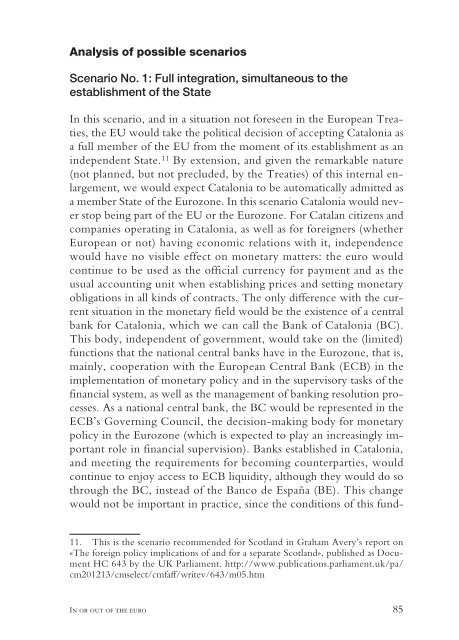The Economy of Catalonia
the_economy_of_catalonia._questions_and_answers_on_the_economic_impact_of_independence
the_economy_of_catalonia._questions_and_answers_on_the_economic_impact_of_independence
Create successful ePaper yourself
Turn your PDF publications into a flip-book with our unique Google optimized e-Paper software.
Analysis <strong>of</strong> possible scenarios<br />
Scenario No. 1: Full integration, simultaneous to the<br />
establishment <strong>of</strong> the State<br />
In this scenario, and in a situation not foreseen in the European Treaties,<br />
the EU would take the political decision <strong>of</strong> accepting <strong>Catalonia</strong> as<br />
a full member <strong>of</strong> the EU from the moment <strong>of</strong> its establishment as an<br />
independent State. 11 By extension, and given the remarkable nature<br />
(not planned, but not precluded, by the Treaties) <strong>of</strong> this internal enlargement,<br />
we would expect <strong>Catalonia</strong> to be automatically admitted as<br />
a member State <strong>of</strong> the Eurozone. In this scenario <strong>Catalonia</strong> would never<br />
stop being part <strong>of</strong> the EU or the Eurozone. For Catalan citizens and<br />
companies operating in <strong>Catalonia</strong>, as well as for foreigners (whether<br />
European or not) having economic relations with it, independence<br />
would have no visible effect on monetary matters: the euro would<br />
continue to be used as the <strong>of</strong>ficial currency for payment and as the<br />
usual accounting unit when establishing prices and setting monetary<br />
obligations in all kinds <strong>of</strong> contracts. <strong>The</strong> only difference with the current<br />
situation in the monetary field would be the existence <strong>of</strong> a central<br />
bank for <strong>Catalonia</strong>, which we can call the Bank <strong>of</strong> <strong>Catalonia</strong> (BC).<br />
This body, independent <strong>of</strong> government, would take on the (limited)<br />
functions that the national central banks have in the Eurozone, that is,<br />
mainly, cooperation with the European Central Bank (ECB) in the<br />
implementation <strong>of</strong> monetary policy and in the supervisory tasks <strong>of</strong> the<br />
financial system, as well as the management <strong>of</strong> banking resolution processes.<br />
As a national central bank, the BC would be represented in the<br />
ECB’s Governing Council, the decision-making body for monetary<br />
policy in the Eurozone (which is expected to play an increasingly important<br />
role in financial supervision). Banks established in <strong>Catalonia</strong>,<br />
and meeting the requirements for becoming counterparties, would<br />
continue to enjoy access to ECB liquidity, although they would do so<br />
through the BC, instead <strong>of</strong> the Banco de España (BE). This change<br />
would not be important in practice, since the conditions <strong>of</strong> this fund-<br />
11. This is the scenario recommended for Scotland in Graham Avery’s report on<br />
«<strong>The</strong> foreign policy implications <strong>of</strong> and for a separate Scotland», published as Document<br />
HC 643 by the UK Parliament. http://www.publications.parliament.uk/pa/<br />
cm201213/cmselect/cmfaff/writev/643/m05.htm<br />
In or out <strong>of</strong> the euro 85


